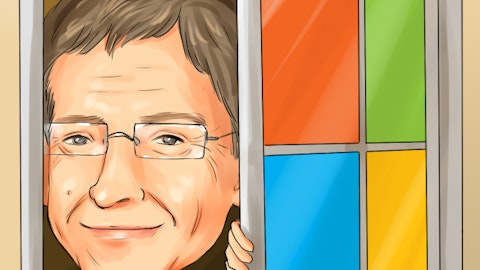Shares of GameStop Corp. (NYSE:GME) have nearly doubled in 2013, and are up more than 170% since last August. The company has shaken off threats to its business model, and bulls are looking forward to the upcoming console refresh.
Still, while there are reasons to like GameStop Corp. (NYSE:GME) right now, longer-term the company remains immensely challenged.
GameStop has bounced back from a rumor-fueled selloff

This is obviously problematic for GameStop Corp. (NYSE:GME), which continues to rely on used games. In fiscal year 2012, about a third of GameStop’s sales, and almost half of its gross profit, came from the sale of used games.
GameStop Corp. (NYSE:GME) benefited from Sony Corporation (ADR) (NYSE:SNE) announcing that they would place no restrictions on the sale of used games.
Microsoft Corporation (NASDAQ:MSFT) initially did have a plan to make used game sales difficult, but later abandoned it after widespread backlash.
Games are going digital
But the larger problem is inescapable: games are going digital. And in a digital market, there’s little room for a brick and mortar retailer, and even less room for a brick and mortar retailer dependent on selling used games — digital games cannot be resold.
Sony and Microsoft may stick with the tried and true model (for now), but new consoles — fully digital, alternative consoles — are coming.
Both Amazon and Google reportedly have Android-based consoles in the works. Given the nature of the Android operating system, it is highly unlikely that these consoles would play anything other than digital games.
Apple, too, could be planning a console, according to Valve’s CEO Gabe Newell. Valve has its own digital-based console in the works — the Steam Box. The service it’s based on, Steam, popularized the concept of digital games in the PC world.
Of course, it isn’t just used game sales that would be hurt by games going digital — about a fifth of GameStop Corp. (NYSE:GME)’s profit comes from the sale of new games. But these new games, stored in boxes and sitting on GameStop’s shelves, would disappear in a world where digital games were dominant.
Microsoft and Sony won’t keep discs around forever
Many investors may be inclined to dismiss those consoles — without seeing them in action, it’s far too soon to declare the established players dead.
Even if one discounts the threat posed by these future consoles, Microsoft and Sony are eventually going to take their business models digital — it’s only a matter of time.
Sony acquired streaming game service Gaikai last year, spending almost half a billion dollars on the company. Sony will use Gaikai’s service on the Playstation 4, offering older games for digital streaming.
But that’s just the beginning. Sony’s management has said the company dreams of offering a “Netflix of games” — a fully streaming digital service, where games are delivered based on a monthly subscription, and the concept of “owning a game” becomes as antiquated as the disc the game is on.
Certainly, this would be immensely beneficial to Sony. Games streamed from a distant server don’t require a powerful console, and powerful consoles are expensive (and thus cost-prohibitive to some consumers). If Sony could incorporate a streaming game service into its Bravia TVs, Xperia tablets and smartphones, it would expand the market for its games.
Then there’s Microsoft. Clearly, the Windows-maker wants to push the Xbox towards digital games. The widespread backlash was enough to delay the transition, but that doesn’t mean Microsoft won’t try again later.
Consider the company’s new plan for its old console, the Xbox 360. Microsoft has started to give away digital copies of older games for free with a subscription to its service, Xbox Live.
Microsoft was initially planning to require Xbox One owners to keep their consoles connected to the Internet. In theory, this would entice more developers to tap Microsoft’s cloud service for their games.
Microsoft has pushed aggressively into cloud computing, and some investors, like the hedge fund ValueAct, believe Microsoft’s real value lies in its public cloud product, Azure.
Games that rely on the power of the cloud to function are inherently digital. If part of the gaming is being rendered on Microsoft’s servers, the files kept on the physical disc do not truly represent the actual game.
It won’t happen overnight, but by the end of their life cycles, both the Xbox One and the PlayStation 4 could be primarily digital consoles.
What about refurbished electronics and its digital game sales?
GameStop’s management understands the challenges to the company’s business long-term. To offset the eventual decline of used games, GameStop has diversified into two areas: refurbished electronics and digital games.
The former is an interesting notion, but seems unlikely to offset the decline of GameStop’s game business. GameStop buys used smartphones, mp3 players and tablets, refurbishes them, and resells them. GameStop has done this for years with used video game consoles.
But GameStop is one of the only companies refurbishing consoles; when it comes to tablets and smartphones, there is plenty of competition: the online service Gazelle, for example, as well as Apple itself. Outerwall is even testing a vending machine concept that would automate the process of buying refurbished electronics.
Then there’s GameStop’s own digital games service — the retailer sells digital games on its website.
Here again, though, the competition is immense. There are innumerable websites (Steam, GOG, Amazon, etc) offering downloaded PC games. And while GameStop also sells digital versions of console games, consumers have no real reason to buy a digital game from GameStop’s website — consoles already have built-in digital marketplaces (Microsoft’s Xbox Arcade, Sony’s Playstation Network).
Investing in GameStop
GameStop has been one of the best stocks to own over the last year. Excitement over the next round of consoles, combined with alleviated fears about used game restrictions, has prompted a powerful rally.
But GameStop’s business model is becoming obsolete. It may take three years, five years or longer, but games — likes music, movies and books — are going digital. And a retailer that depends on the sale of physical games — whether they be used or new — is in trouble.
The article GameStop Is Still a Value Trap originally appeared on Fool.com and is written by Sam Mattera.
Sam Mattera is long GameStop Puts dated January 2015. The Motley Fool owns shares of GME and Microsoft.
Sam is a member of The Motley Fool Blog Network — entries represent the personal opinion of the blogger and are not formally edited.
Copyright © 1995 – 2013 The Motley Fool, LLC. All rights reserved. The Motley Fool has a disclosure policy.




